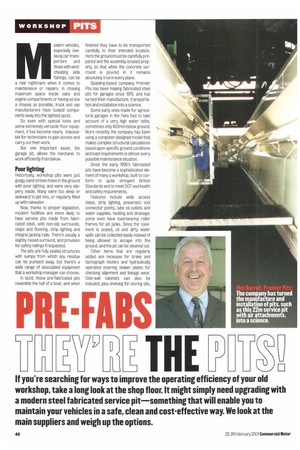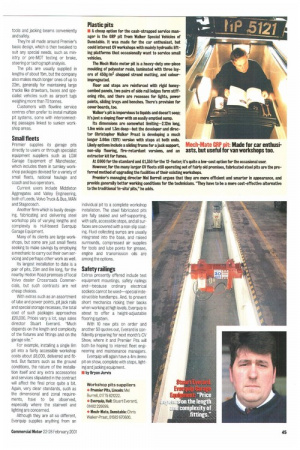IIII odern vehicles, especially lowslung car trans porters and those
Page 46

Page 47

If you've noticed an error in this article please click here to report it so we can fix it.
with windcheating side fairings, can be a real nightmare when it comes to maintenance or repairs. In chasing maximum space inside cabs and engine compartments or having as low a chassis as possible, truck and van manufacturers have tucked components away into the tightest spots.
So even with special tools and some extremely versatile floor equipment, it has become nearly impossible for technicians to gain access and carry out their work.
But one important asset, the garage pit, allows the mechanic to work efficiently from below.
Poor lighting
Historically, workshop pits were just gungy sand-strewn holes in the ground with poor lighting, and were very slippery inside. Many were too deep or awkward to get into, or regularly filled up with rainwater.
Now, thanks to proper legislation, modern facilities are more likely to have service pits made from fabricated steel, with non-slip surrounds, steps and flooring, strip lighting and integral jacking rails. There's usually a slightly raised surround, and provision for safety railings if requested.
The pits are fully sealed structures with sumps from which any residue can be pumped away, but there's a wide range of associated equipment that a workshop manager can choose.
In build, these pre-fabricated pits resemble the hull of a boat, and when finished they have to be transported carefully to their intended location. Here the ground must be carefully prepared and the assembly located properly, so that when the concrete surround is poured in it remains absolutely true in every plane.
Spalding-based company Premier Pits has been making fabricated steel pits for garages since 1978, and has turned their manufacture, transportation and installation into a science.
Some early ones made for agricultural garages in the Fens had to take account of a very high water table, sometimes only 400mm below ground. More recently the company has been using a computer-designed model that makes complex structural calculations based upon specific ground conditions and load requirements in almost every possible maintenance situation.
Since the early 1990's fabricated pits have become a sophisticated element of many a workshop, built to conform to quite stringent British Standards and to meet DOT and health and safety requirements.
Features include wide access steps, strip lighting, pneumatic tool connector points, lube oil outlets and water supplies, heating and drainage; some even have load-bearing roller frames for pit jacks. Since the casement is sealed, oil and dirty water spills can be collected easily instead of being allowed to escape into the ground, and the pit can be cleaned out.
Other items that are regularly added are recesses for brake and tachograph testers and hydraulically operated steering shaker plates for checking alignment and linkage wear. Side-wall cabinets can also be included, plus shelving for storing oils, tools and jacking beams conveniently and safely.
They're all made around Premier's basic design, which is then tweaked to suit any special needs, such as ministry or pre-MOT testing or brake, steering or tachograph analysis.
The pits are usually supplied in lengths of about 15m, but the company also makes much longer ones of up to 22m, generally for maintaining large trucks like drawbars, buses and specialist vehicles such as airport tugs weighing more than 70 tonnes.
Customers with flowline service centres often prefer to instal multiple pit systems, some with interconnecting passages linked to sunken workshop areas.
Small fleets
Premier supplies its garage pits directly to users or through specialist equipment suppliers such as LGM Garage Equipment of Manchester, which includes them in turnkey workshop packages devised for a variety of small fleets, national haulage and coach and bus operators.
Current users include Middleton Aggregates and Valley Engineering, both of Leeds, Volvo Truck 84 Bus, MAN and Stagecoach.
Another firm which is busily designing, fabricating and delivering steel workshop pits of varying lengths and complexity is Hull-based Everquip Garage Equipment.
Many of its clients are large workshops, but some are just small fleets seeking to make savings by employing a mechanic to carry out their own servicing and perhaps other work as well.
Its largest installation to date is a pair of pits, 23m and 8m long, for the nearby Hedon Road premises of local Volvo dealer Crossroads Commercials, but such contracts are not cheap choices.
With extras such as an assortment of lube and power points, pit jack rails and special storage recesses, the total cost of such packages approaches £20,000. Prices vary a lot, says sales director Stuart Everard. "Much depends on the length and complexity of the fixtures and ratings and on the garage site."
For example, installing a single 8m pit into a fairly accessible workshop costs about £8,000, delivered and fitted. But factors such as the ground conditions, the nature of the installation ter and any extra accessories and services stipulated in the contract will affect the final price quite a bit. Again, very clear standards, such as the dimensional and zonal requirements, have to be observed, especially where the stairwell and lighting are concerned.
Although they are all so different, Everquip supplies anything from an individual pit to a complete workshop installation. The steel fabricated pits are fully sealed and self-supporting, with safe, accessible steps, and all surfaces are covered with a non-slip coating. Fluid collecting sumps are usually integrated into the base, and raised surrounds, compressed air supplies for tools and lube points for grease, engine and transmission oils are among the options.
Safety railings
Extras presently offered include test equipment mountings, safety railings and—because ordinary electrical sockets cannot be used—special indestructible handlamps. And, to prevent short mechanics ricking their backs when working at high levels, Everquip is about to offer a height-adjustable flooring system.
With 10 new pits on order and another 50 quotes out, Everard is confidently preparing for next month's CV Show, where it and Premier Pits will both be hoping to interest fleet engineering and maintenance managers.
Everquip will again have a 4m demo pit on show, complete with steps, lighting and jacking equipment.
• by Bryan Jarvis




































































































